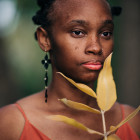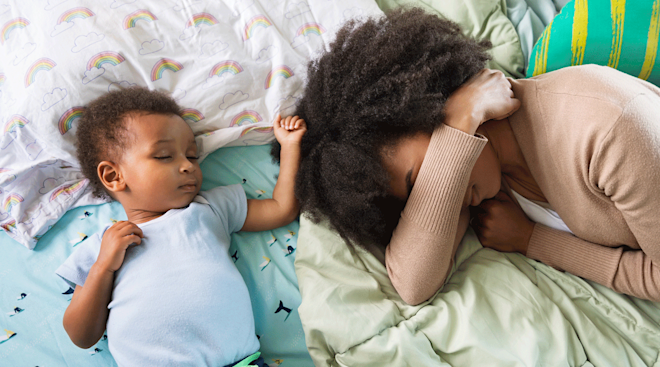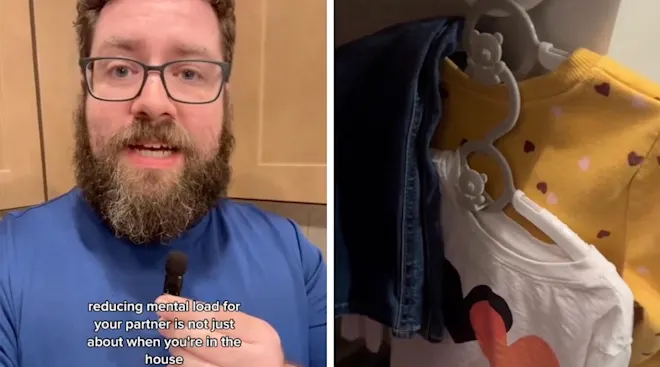Why Black Moms Face Higher Rates of Burnout (and How to Cope)
I felt overwhelmed by the impending trials of Black motherhood from the moment I saw my positive pregnancy test. Even before my first ultrasound, a whirlwind of transitions, statistics and assumptions swooped in, snatching any hope I had to focus on the excitement of this milestone moment. I quickly learned that pregnancy was basic training for the battle of mothering while being Black. There were no days off, and I knew I’d need to develop the hypervigilance required of raising a Black child in America. Two children and eight years later, the battle continues—and so does the exhaustion.
Black moms are keenly aware of the disproportionate risks we face at each stage of life. I was raised knowing we forge on despite the legacies of historical racism through redlining, environmental contaminants and food deserts. My job was to mitigate the damage, despite being exhausted and overwhelmed. Failure wasn’t an option for me. I’d witnessed my mother and the women in my family do more with less. I was determined to thrive in motherhood. But that didn’t mean that I wouldn’t feel the burn.
The World Health Organization (WHO) says that “burnout is a syndrome conceptualized as resulting from chronic workplace stress that has not been successfully managed.” While it’s not a medical condition, its impact can have serious health consequences punctuated by energy depletion or exhaustion, increased mental distance and/or feelings of negativity and reduced efficacy.
And while the WHO and many others apply the term “burnout” exclusively in an occupational context, millions of women were socialized to see mothering as a never-ending job, and thus burnout is a very real struggle among moms.
Moreover, Black moms face a whole other layer of systemic challenges and familial issues that contribute to burnout. Adia Gooden, PhD, a clinical psychologist, self-worth coach and host of the Unconditionally Worthy podcast, says that many Black women grew up in families and communities with Black mothers who were matriarchs and took care of everything. “They worked outside of the home and were the primary people who cooked, cleaned and managed the home in the evenings and weekends,” she says. “Black mothers are idealized in Black communities as people who always have things handled and provide support and nurturing for everyone else.” The problem is that this downplays—if not ignores—the structural inequities that seek to impede Black motherhood.
Today’s moms face different yet familiar stressors from previous generations. Communities remain segregated, under-resourced and unsafe. Black moms in these conditions face risks for elevated mental health concerns like PTSD and depressive symptoms. But education and social mobility don’t necessarily erase this risk. Childcare deserts and budget-breaking costs of child care aren’t limited by zip code. Neither are the exhaustion and perinatal and maternal health concerns that contribute to weathering and biological stress. On top of this, many Black mothers assume an I-can-do-everything mindset. It’s called the “Superwoman schema” or “Superwoman syndrome”—an expectation to do it all at home, at work and everywhere in between. It adds to the already mounting pressure.
Gooden says witnessing these dynamics leaves Black moms living up to an impossible standard, even when they have the means to change things. Despite appearances, many Black moms are drowning on the inside. “When we believe that our worth is based on meeting certain conditions, such as being the perfect mom, partner, employee, boss, family member, etc., we are more likely to overextend and overwork ourselves, and end up in burnout,” says Gooden. “While burnout is partly caused by systemic factors, having difficulty setting boundaries and prioritizing self-care certainly contribute.”
If you’re feeling burnt out, you’re not alone. Fortunately, there are ways to manage the pressure and lighten the mental load. Here, experts offer words of wisdom.
Know the signs of burnout
Mental health stigma and limited access to resources make it hard for Black moms to receive the care they need. “Burnout can show up in mothers in a number of ways, including irritability; being quick to get upset or angry; exhaustion; frustration with herself, her child and partner; feeling like she’s not doing anything well or a desire to escape her life,” says Gooden.
Gooden adds that contemporary moms may feel like they’re failing when they don’t see themselves living up to their own mom’s examples or, worse, they might feel guilty asking for help. The culture of individualism intensifies this. “Because problems are often individualized in our society, Black mothers may feel that they’re doing something wrong when navigating these challenges when they are systemic issues,” she says.
Reflect on the messages you learned about motherhood
Christina Garrett, productivity coach and founder of The Momathon Diaries, says there’s often a disconnect between what we imagine and what we receive as mothers. We weren’t considering the exhaustion, busyness and never-ending to-do list. Rather, we expect our loved ones and employers to “see us,” and automatically know how we need help. “The assumption that postpartum is only a few months after birth can cause any mom to be blindsided,” she adds. Black moms can interrupt these cycles by communicating their needs to themselves and others.
Personalize and prioritize rest
Garrett says that most often, moms speak to memories of mothers, grandmothers and aunties “handling the home, raising the children and hustling to get dinner on the table.” She encourages asking yourself, ‘Did I see the matriarchs in my family rest?’ Acknowledging when you’re exhausted and identifying activities that fill your cup is also important.
Release the reins—and accept help
Garrett says that healthy communication is crucial to healing burnout, and notes the importance of learning to release the reins. “I always suggest getting specific with your loved ones. This can be as simple as asking your partner to take over the bedtime routine or chauffeuring the kids to practices on specific days of the week,” she says. Moreover, communicating your personal or professional goals with your support system can help: “If we can share how we specifically need adjustments to our regular schedule, it helps to break up the monotony and allow others to support you,” she adds
Still, Garrett says there’s nothing wrong with learning to delegate. “Doing this work is the true meaning of “the soft life”—creating a family and career balance that unloads our stress and lets us breathe into our own definitions of rejuvenation, Garrett says.”
Know you’re worthy outside of your labor
For me, making these shifts required seeing my status as a mother outside of what I do for others. I needed reminders that my value is internal.
Gooden notes that self-worth, grace and compassion are essential parts of recovering from burnout caused by motherhood’s internal and external pressures. She offers the following frame when developing at-home strategies for burnout:
- I See You. Take a moment to tune into yourself and notice how you’re feeling in this moment.
- I Accept You. Offer yourself acceptance for however you are feeling and how you are mothering right now.
- I Affirm You. Say something kind and affirming to yourself. Acknowledge that you’re doing your best.
- I Care For You. Consider one thing you can do to offer yourself care in this moment; maybe that’s calling a friend to come over and watch the baby while you shower or making yourself your favorite cup of tea,” Gooden suggests.
Recovering from burnout is a lifelong journey. To get there, I’ve started to reframe motherhood and the lessons I’ve been taught about how mom should move through life. The work isn’t easy, but it is life-saving.
Please note: The Bump and the materials and information it contains are not intended to, and do not constitute, medical or other health advice or diagnosis and should not be used as such. You should always consult with a qualified physician or health professional about your specific circumstances.
Plus, more from The Bump:
Christina Garrett, is a productivity coach and founder of The Momathon Diaries.
Adia Gooden, PhD, is a clinical psychologist, self-worth coach and host of the Unconditionally Worthy podcast.
World Health Organization (WHO), Burn-out an "occupational phenomenon": International Classification of Diseases, May 2019
Journal of Racial and Ethnic Health Disparities, Black Mothers in Racially Segregated Neighborhoods Embodying Structural Violence: PTSD and Depressive Symptoms on the South Side of Chicago, January 2023
Navigate forward to interact with the calendar and select a date. Press the question mark key to get the keyboard shortcuts for changing dates.





















































